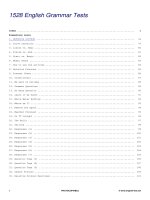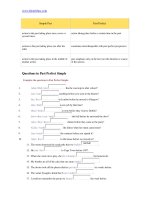Kiểm tra ngữ pháp chapter 12 clauses
Bạn đang xem bản rút gọn của tài liệu. Xem và tải ngay bản đầy đủ của tài liệu tại đây (59.85 KB, 4 trang )
SEQUENCE OF TENSES(HOÀ HP THÌ)
I/ Sequence in noun clauses(sự hoà hợp thì giữa mệnh đề chính và mệnh đề danh
từ)
1/ Khi mệnh đề chính ở một thì mốc hiện tại(hiện tại đơn/ hiện tại tiếp
diễn/ hiện tại hoàn thành)thì ở mệnh đề danh từ có sự liên kết chặt chẽ hợp lý
với các trạng ngữ kèm theo diễn tả thời gian của hành động xảy ra.
Examples :
Ex1:I see that I haven’t understood the lession yet.
Ex2:He says that he often comes here.
Ex3: He says that he will get married next year.
Ex4:She knows that you arrived yesterday.
Ex5:you have already told me that you are going to quit your job.
2/ Khi mệnh đề chính ở một thì mốc quá khứ (quá khứ đơn/ quá khứ tiếp
diễn/ quá khứ hoàn thành)
động từ ở mệnh đề danh từ cũng ở một thì ở mốc quá khứ.
Ex1:He had done all that was necessary.
Ex2:He saw that he had made a mistake.
Ex3:He found that the road was very long.
*Note 1:Với những trạng ngữ ALWAYS chẳng hạn,thì liên kết với nó phải
ở quá khứ,với TOMORROW chẳng hạn thì liên kết với quá khứ WOULD,với
ALREADY ,thì liên kết với nó phải quá khứ hoàn thành.
Ex1: He saw that he always made a mistake.
Ex2:He said that he would be here tomorrow.
Ex3:He believed that his friend had already forgtten him.
*Note 2:Khi động từ trong mệnh đề danh từ diễn tả một sự kiện ,một hành
động ,một chân lý,một sự thật thường tình ,hoặc một thói quen còn cho tới
nay,thì hiện tại được dùng dù cho mệnh đề chính ở quá khứ.
Ex1:Galileo found that the earth is round.
Ex2:He proved that the earth goes round the sun.
Ex3:He said that he often gets up at 8:00.
II/ Sequence in adjective clauses
(sự hoà hợp thì giữa mệnh đề chính và mệnh đề tính từ)
Động từ trong mệnh đề chính không kèm chế thì của mệnh tính từ .Dường như sự
liên kết thì và trạng ngữ thời gian hoàn toàn hợp lý để diễn tả thời gian mà
hành động xảy ra theo ý của người nói.
Ex1:The letter that I received yesterday is on my desk.
Ex2:Yesterday I met the man who is going to speak next.
III/ Sequence in adverbial clauses of time
(sự hoà hợp thì giữa mệnh đề chính và mệnh đề trạng từ)
Có 6 trường hợp hoà hợp:
Trường hợp
Main clause
1/Mệnh đề chính
diễn tả một
thói quen.
Thì hiện
tại
Conjunctions
when
……while
Clause of time
Mốc hiện
tại(hiện tại
đơn/ hiện tại
tiếp diễn/ hiện
tại hoàn
thành)
Examples
Ex1:We always take our umbrellas
with us when it rains.
Ex2:I usually read the newspaper
while I am waiting for the bus.
Ex3:He never goes home before he
has finished his work..
…as
…as soon as
Until
Before
after
2/Mệnh đề chính Thì quá
diễn tả một
khứ
hoạt động trong
quá khứ.
3/ Mệnh đề
chính diễn tả
một hoạt động
trong tương lai.
Thì tương lai
(tương lai
đơn hoặc
tương lai
hoàn
thành
hoặc Be
going to )
Thì quá
khứ tiếp
diễn
Mốc quá
khứ(quá khứ
đơn/ quá khứ
tiếp diễn/ quá
khứ hoàn
thành)
Hiện tại(hiện
tại đơn/ hiện
tại hoàn
thành)
4/ Mệnh đề
Quá khứ đơn
chính diễn tả
hoặc quá khứ
một hoạt động
tiếp diễn
đang diễn ra thì
có hành động
khác xen vào/
tả hai hoạt động
đồng thời đang
diễn ra.
5/ Mệnh đề
Thì quá
Chỉ dùng thì
chính diễn tả
khứ hoàn
quá khứ đơn
một hoạt động
thành
thôi
xảy ra trước
một thời điểm
quá khứ hoặc
hành động quá
khứ khác
6/ Mệnh đề
Thì hiện
Quá khứ đơn
chính diễn tả
tại hoàn
một hoạt động
thành
xảy ra bắt đầu
từ quá khứ
kéo dài đến
hiện tại hoặc
tương lai
*EXERCISES : SUPPLY THE CORRECT VERB TENSE :
Ex1:I sat near the window whenever
I took the bus.
Ex2:I met him while I was walking
down the street.
Ex3:He left after he had finished his
work.
Ex1:He will go when you finish your
work.
Ex2:We will have already finished
the work when you get back.
Ex3:I am going to wait until you
have finished your work.
Ex1:It was raining hard when I got
there.
Ex2:I was watching TV while my
father was reading .
Ex1:The train had already left when
I arrived at the station.
Ex1 :She has played the piano since
she was a child.
1) Yesterday ,I (watch)………………………….television after I (finish)………………………
my homework.
2) My elder brother (join)………………………….the army when he (be)
……………………….eighteen.
3) When the teacher came in ,the pupils (play)………………………………
4) Yesterday ,while I (write)…………………………a letter ,the telephone ( ring)
……………………………..
5) He (leave)……………………………as soon as he (hear )………………………….the news
last night.
6) I opened the door just as my boy-friend Tom ( ring )…………………………the bell.
7) Until she spoke I ( not realize ) ……………………..she (be)……………………… foreign.
8) Dick (start ) ……………………school before he (be) ……………………………seven.
9) You (feel)……………………………..better after you have something to eat .
10) Susan (play)………………………………chess since she was a child.
11) Bill said he (forget)……………………….to buy a new dictionary.
12) Helen regretted that she (not can )……………………go with us.
13) Our teacher (tell)………………………….us yesterday that he (visit)
…………………..England in 1970.
14) Our friends asked us why we (come)…………………………… here so early.
*MULTIPLE CHOICE TEST :
1) He fell down when he --------- to wards the church.
A). run
B). runs
C). was running
D) had run
2) We --------- there when our father died.
A). still lived B) lived still C) was still living
D). were still living
3) They --------- pingpong when their father comes back home.
A). will play B). play
C. will be playing
D. would play
4). I’ll come and see you before I --------- for America.
A). leave
B). will leave C. have left
D). shall leave
5). The little girl asked what --------- to her friend.
A. has happened B. happened C. had happened
D. would have been happened
6). John --------- a book when I saw him.
A). is reading B). read
C). was reading
D). reading
7). He said he --------- return later.
A). will
B). would
C) can
D). would be
8). When I last saw him, he -------- in London.
A). has lived B) is living
C). was living
D). has been living
9). After I --------- lunch, I looked for my bag.
A). had
B). had had C). have has
D). have had
10). Henry -------- into the restaurant when the writer was having dinner.
A). was going B. went
C). has gone
D). did go
11). He will take the dog out for a walk as soon as he -------- dinner.
A). finish
B). finishes C). will finish
D). shall have finished
12). Before you asked, the letter ---------.
A). was written B). had been written C). had written D). has been written
13). I shall be glad when he ----------A). had gone
B) did go C). went
D). has gone
14). Ask her to come and see me when she ---------- her work.
A). finish
B). has finished C. finished
D). finishing
15). After you finish your work, you --------- a break
A) should take B). have taken C). might have taken D). takes
16). Almost everyone -------- for home by the time we arrived.
A). leave
B). left
C). leaves
D). had left
17). While her husband was in the army, Janet ---------- to him twice a week.
A). was writing B). wrote
C). was written D. had written
18). Since ------------, I have heard nothing from him.
A). he had left
B). he left
C) he has left D). he was left
19). “How are you feeling?” “I’ve been feeling better since ---------.”
A). the doctor has came
B). the doctor will come
C). the doctor had come
D). the doctor came
20). “I took the TOEFL. It was really hard.” “---------- a lot before you took it?”
A). Have you studied
B). Did you studied
C). Had you studied
D). Do you study
21). Did you say that you ------------ here only three days ago?
A).came
B). have come
C). had came D). come









